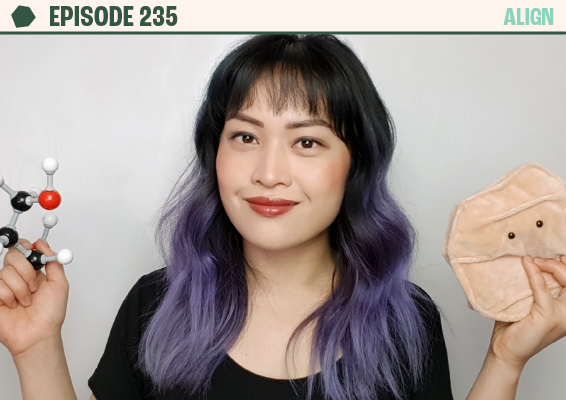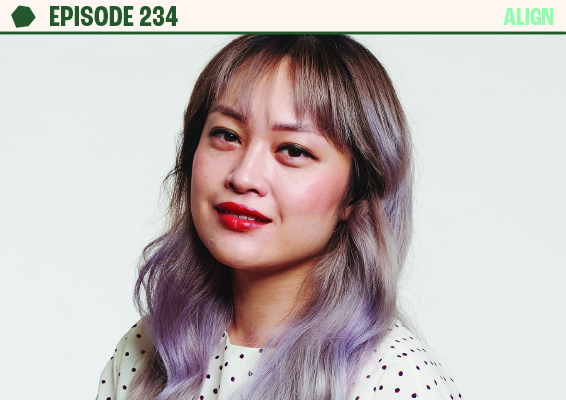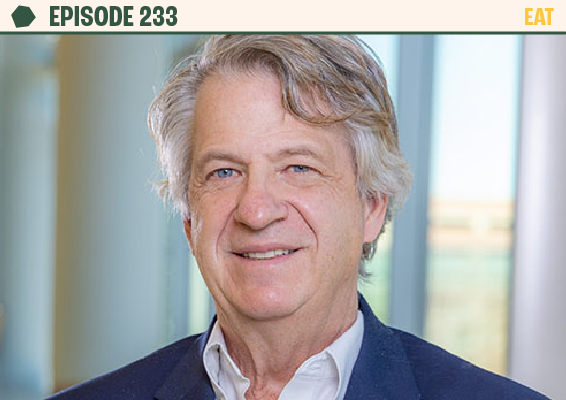In Episode #235, cosmetic chemist Dr Michelle Wong returns for an extensive exploration of skincare.
“Our skin has evolved with the environment – a lot of the time it can take care of itself quite well if we just leave it alone a bit.”
In last week’s episode, Dr Michelle Wong introduced the topic of cosmetics to The Proof, with a focus on sunscreen. We explored the foundations of cosmetic chemistry, and today Dr Wong returns to look more closely at the products many of us use on a daily basis. If you’ve ever wondered about the safety and effectiveness of skincare products, haircare, and deodorant, this is the episode for you.
We’ve established that the ingredients used in cosmetic products are, by and large, safe. Today we focus on what may help you actually see results.
Michelle Wong, PhD is a science educator and cosmetic chemist with a PhD in chemistry. She helps wide audiences understand the science behind beauty products through her website and social media presence, Lab Muffin Beauty Science. With an extensive education and a background in science communication, Dr Wong engages in this conversation with insight and evidence.
“A lot of these ingredients that have been demonised are actually less risky, because a lot of their replacements just haven’t been studied as much.”
This episode is jam-packed with topics, examined from a scientific lens. We explore acne, pigmentation, and how different skin tones age. Dr Wong breaks down many common active ingredients including niacinamide, retinol, and hyaluronic acid, explaining how these work and whether you will see results. She also offers her advice for skincare products at any budget, tips on building a skincare routine, and how to spot potentially misleading marketing claims.
Specifically, we discuss:
- Intro (0:00)
- Defining ‘Clean Beauty’ (2:17)
- ‘Natural’ vs synthetic (7:14)
- EWG’s Skin Deep Database (8:26)
- What to Avoid (10:17)
- Is the Risk worth the Reward? (15:32)
- PFAs (20:25)
- “Free From” Claims (22:59)
- Risk During Pregnancy (30:08)
- Effective Ingredients (32:56)
- Addressing the Root Cause of skin issues (35:05)
- Skin’s ability to Heal (36:11)
- Danger in Combining Ingredients (38:06)
- Aging & Collagen (40:21)
- Combining Multiple Products (52:02)
- Does Price Indicate Effectiveness? (54:16)
- Participants in Studies (59:31)
- Preventative Aging (collagen vs retinol) (1:01:57)
- Hyaluronic Acid (1:07:49)
- Exfoliation (1:09:57)
- Skin Microbiome (1:15:14)
- Pigmentation (1:17:24)
- Overrated Ingredients (1:19:27)
- Natural Plant Compounds (1:21:27)
- Acne (1:24:36)
- Hair Care (1:32:47)
- Shampoo/ Conditioner (1:37:34)
- Hair Loss (1:40:41)
- What to Avoid (1:42:01)
- Deodorants (1:44:49)
- Society’s Beauty Standards (1:51:12)
- Outro (1:55:29)
If you’ve ever felt lost amongst the sea of misleading claims and conflicting advice available online, I hope this episode provides some clarity to you. Importantly, I also hope our closing comments on beauty constructs and societal standards help position you to navigate this industry with an internal lens.
To connect with Michelle Wong, PhD, you can find her via the Lab Muffin Beauty Science social accounts on Instagram, TikTok, Twitter, and YouTube. For a comprehensive guide on skincare basics, Dr Wong has an eBook available for purchase here. Listen to Dr Wong’s previous appearance on The Proof, focusing on sunscreen, at Episode #234.
The best way to support the show is to use the products and services offered by our sponsors. To check them out, and enjoy great savings, visit theproof.com/friends.
Enjoy, friends.
Simon
More about Michelle Wong, PhD
Michelle Wong, Ph.D. is a science educator and cosmetic chemist with a PhD in chemistry. She’s behind Lab Muffin Beauty Science, where she explains the science behind beauty products for a general audience. Founded in 2011, Lab Muffin Beauty Science receives 2 million page views per year, and has an Instagram following of 384 000 and a YouTube audience of 341 000. Through her science education work, Michelle has worked with a range of brands on campaigns, including Proctor & Gamble and Johnson & Johnson. Her work has been featured in international magazines including The New York Times and Elle Magazine.
Supporting studies
- A topical antioxidant solution containing vitamins C and E stabilized by ferulic acid provides protection for human skin against damage caused by ultraviolet irradiation • PMID: 18603326
- Retinoid stability and degradation kinetics in commercial cosmetic products • PMID: 33206444
- Topical 8% glycolic acid and 8% L-lactic acid creams for the treatment of photodamaged skin. A double-blind vehicle-controlled clinical trial • PMID: 8651713
- Use of nicotinamide in dermatology • PMID: 28052374
- What is the Role of Benzoyl Peroxide Cleansers in Acne Management?: Do they Decrease Propionibacterium acnes Counts? Do they Reduce Acne Lesions? • PMID: 21218192
Additional resources
- The Lab Muffin Guide to Basic Skincare • Lab Muffin Beauty Science








